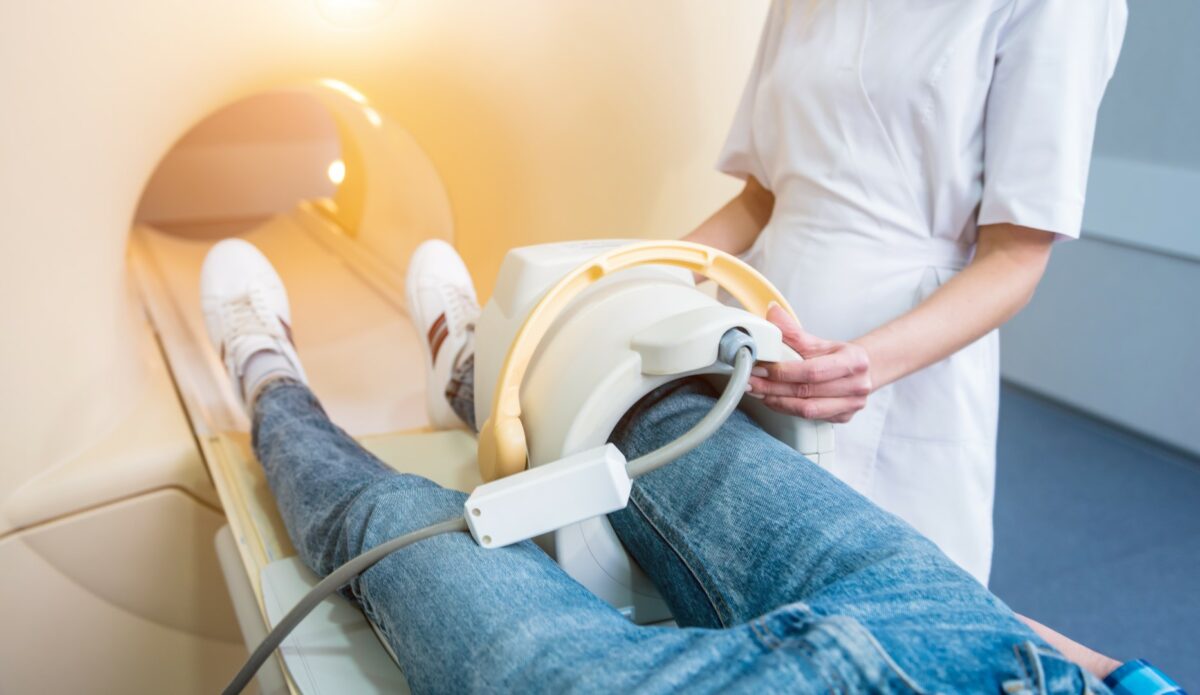
If you are experiencing discomfort or pain in your knee, your healthcare provider may recommend a knee MRI to aid in the diagnosis and evaluation of the issue. An MRI, short for Magnetic Resonance Imaging, is a highly advanced and frequently used diagnostic imaging test that can identify abnormalities within the musculoskeletal system.
What Is a Knee MRI? When Is It Done?
 A knee MRI is a specialized imaging procedure that shows detailed images of the knee joint and the surrounding tissues. It is a noninvasive and safe exam that uses radiofrequency waves and a powerful magnet to create detailed images of the interior of the body. Unlike some other diagnostic tools like CT scans, MRIs do not involve radiation exposure, making them a very safe option for evaluating knee conditions.
A knee MRI is a specialized imaging procedure that shows detailed images of the knee joint and the surrounding tissues. It is a noninvasive and safe exam that uses radiofrequency waves and a powerful magnet to create detailed images of the interior of the body. Unlike some other diagnostic tools like CT scans, MRIs do not involve radiation exposure, making them a very safe option for evaluating knee conditions.
A knee MRI may be recommended when you experience:
- Knee pain: persistent or severe knee pain that requires further evaluation
- Weakness: unexplained weakness or instability in your knee joint
- Swelling: significant and unexplained swelling in the knee
- Bleeding: symptoms of bleeding in and around the knee joint
According to the Radiological Society of North America, an MRI is commonly ordered to help orthopedic doctors diagnose and treat a number of knee conditions, including but not limited to:
- Damaged cartilage, meniscus, ligaments, or tendons
- Sprains
- Torn ligaments, cartilage, or tendons
- Bone fractures, especially those not visible on X-rays or other imaging tests
- Arthritis-related damage
- Fluid buildup in the knee joint
- Infections
- Tumors involving the bones and joints
- Knee Instability: a sensation that your knee is giving way
- Reduced range of motion
- Kneecap injury or pain
- Complications related to implanted surgical devices
- Post-surgery pain or trauma
Knee MRIs can also be combined with X-rays and CT scans to provide a more comprehensive assessment of an injury or condition.
How Do You Prepare for an MRI?
Preparing for an MRI is relatively straightforward, but there are some important steps to follow: tell your physician about any medications you are taking, including over-the-counter drugs and herbal supplements; mention any known allergies or an allergic reaction to contrast dye; inform them if you have any implanted medical devices, and let them know if you are pregnant, concerned you may be pregnant, or breastfeeding.
In addition, doctors recommend you wear comfortable clothes—preferably cotton—and leave your jewelry and valuables at home. You may be asked to wear a gown, as well.
How Long Does a Knee MRI Take?
The whole MRI scanning process can take approximately 30-60 minutes. The duration can vary depending on factors such as the complexity of the scan and the need for contrast dye. Here is how the knee-scanning process goes:
- You will be required to lie down on the scanning table, feet first
- You will be given earplugs/headphones to protect your hearing from the noises of the scanner
- Your knee will be placed into a device to obtain optimal images
- The scanning table will slide your body into the tube-shaped scanner feet first
- During the scan, you will not feel anything
- You will hear loud intermittent humming, clicking, and knocking sounds
- You will be asked to stay very still during the scan to optimize the image quality
- The technologists will be able to see and hear you at all times during the scan if you need to communicate with them via an intercom system that is within the scan room
Is a Knee MRI Part of a Whole-Body Scan?
A knee MRI is focused exclusively on the knee joint and the surrounding structures. Your whole body does not go into the scanner—only your feet first up to and including the whole knee. It is not a whole-body MRI.
Is an MRI Expensive?
The cost of an MRI can vary widely based on several factors, including your location, the facility where the MRI is performed, and your insurance coverage. It is essential to check with your healthcare provider and your insurance company to understand the potential costs involved and any financial responsibilities you may have.
At EmergeOrtho—Blue Ridge Region, we understand that getting a quick and accurate diagnosis for your knee issue is essential to the success of your treatments. Having the advanced diagnostic facilities on our premises enables our board-certified physicians to help you quickly and affordably receive treatment and return to your active life.
If you are experiencing pain or issues with your knee, you should consult with an orthopedic expert to start on your path to recovery. Schedule your appointment here.







